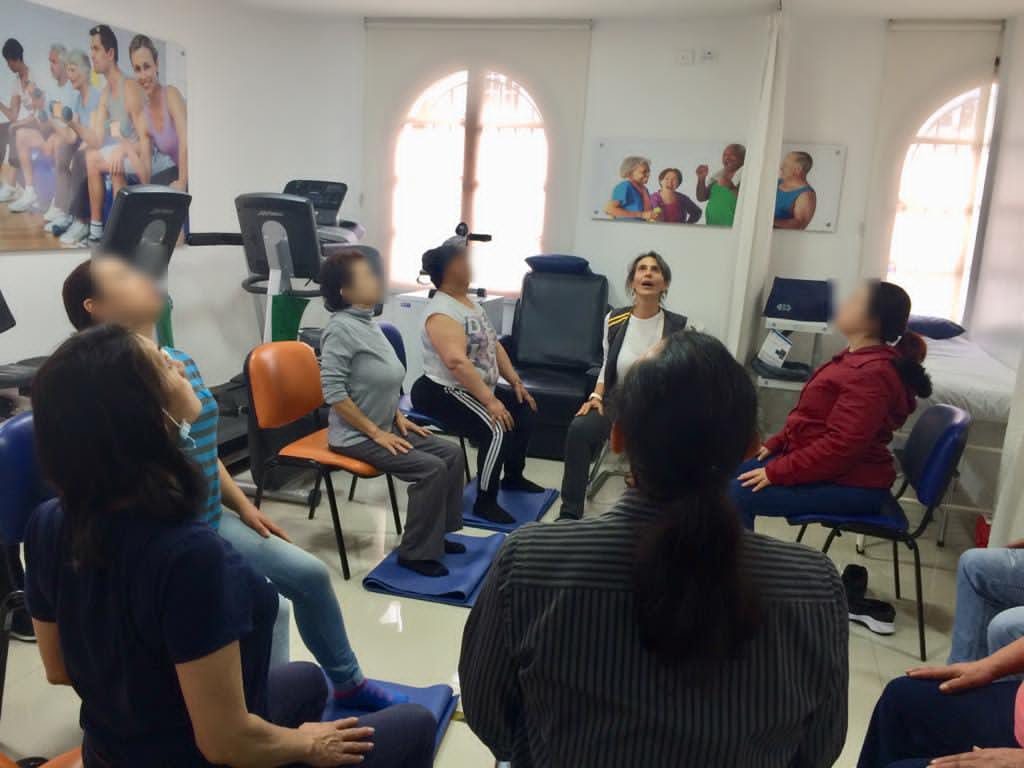Inside Teaching for Equity: Maria (Amma) Claudia Fandiņo Orozco
by Jenn Bodnar | July 30, 2021 4:36 am
Maria (Amma) Fandiño Orozco, MSc, RYT 500 has been a devoted yoga practitioner for over 28 years and an enthusiastic biologist for 27 years. Amma’s passion is sharing yoga with communities with challenges and vulnerable conditions -be they physical, mental, or emotional. Her work includes teaching yoga to cancer patients to help contribute to their quality of life and ability to cope with the difficult circumstances of the disease. She is also dedicated to providing space that promotes empowerment, rehabilitation, and healing for those deprived of liberty and supports substance use recovery processes. Amma lives in Colombia with her husband and two kids and loves to spend her free time in contact with nature.
“I dedicate my efforts to provide students with a yoga practice that promotes self-empowerment, love, and appreciation as key aspects to connect with their inner essence and infinite capacity to transform their own lives. ”
What a pleasure to have her share her experience with Yoga Digest!
Jenn: How did you get into yoga?
Amma: My yoga journey began 26 years ago when I finished my degree in Biology and started working on the environmental field in Colombia. By that time, I started taking yoga classes and since then, Yoga has been inspiring and permeating all aspects of my life, being dedicated to this practice uninterruptedly. Perhaps, as a biologist, my love and appreciation towards nature brought me to Yoga. My passion has always been to be outside connecting with the peace and the beauty of nature. So, when I started to practice hatha yoga and meditation, I just felt the very same connection that I feel when I spend time in the woods.

Jenn: How did you get into teaching yoga?
Amma: When I moved to Santa Barbara, Ca, with my family in 2014, I decided to take a pause in my professional career and dedicate fully to deepen my yoga practice and become a Yoga teacher. Santa Barbara Yoga Center became my second home for three years. After finishing the 200-hr Integral Yoga training, I continued my instruction, and finished the 300-hr training focusing in Accessible Yoga, as I had the fortune to have Jivana Heyman, the founder/director of this Program, as my mentor and teacher. I feel a total connection with the Accessible Yoga vision of sharing the benefits of Yoga with all, especially with those who have been marginalized.
Jenn: How did you become curious about teaching for equity?
Amma: Since I started my relationship with Yoga Alliance in 2015, first as a RYT200 and later as a RYT500, I ´ve been noticing a wonderful evolution in their vision and the values and principles promoted for yoga teachers to have, related accessibility and inclusivity. In this sense, when I knew about the Teaching for Equity Pilot Program, I felt so excited and inspired to apply since it was open worldwide to teachers with yoga teaching experience within a historically marginalized community, in my case, the incarcerated.

Jenn: Tell us about your specific community.
Amma: I teach yoga to incarcerated populations, women and men. I ´ve taught to different groups in different prisons, in-person in Bogotá, and virtually in other locations in Colombia. Some of the specific groups have been senior women, prisoner women from armed conflict crimes, and men pertaining to the prison ´s mental health unit. The last being one of the most excluded and marginalized groups within the prison. I also teach to low-income cancer patients and their caregivers at a palliative care center in Bogotá.
Jenn: What are some challenges you face in your community?
Amma: One of the main challenges in prison has been the precarious conditions to teach. In most cases, the chairs are the only tool we have available for the class. Even, finding a convenient place to run the class has been a real challenge. In different opportunities, we have only had access to an outdoor space in the central patio. Recently, with the pandemic, the main challenges are technological, as stable internet connection, cameras, and sound. At the palliative care center, the main challenge we face today is to engage patients to participate virtually; we have lost most of the community aspect of the classes in person which has been deeply valued by the patients and their caretakers.

Jenn: What are some of your happiest moments? What big wins have you experienced within your community and teachings?
Amma: Every time I teach to the prison and to the palliative care center, I feel that I get way more than what I give, and by far, the wins and happy moments have been more than the difficulties. Contributing to the process of rehabilitation and healing of the inmates as well as helping to improve the quality of life of the cancer patients is something which I have no words to describe, the connection and happiness I feel about the opportunity to share the benefits of yoga practice with groups of people who wouldn’t normally be exposed to it.
Jenn: Where would you like to see your work in five years?
Amma: I envision continuing my work with prisons and cancer and expanding access to the practice of yoga under the principles of accessibility and inclusiveness. There is much need in Latin communities for a yoga practice sensitive to the differences and diversity and appropriate for all regardless of their conditions and background. In particular, my commitment for the following years is to contribute to strengthening the capacity and skills of Spanish-speaking yoga teachers in Colombia and other countries to offer accessible, inclusive, and trauma-informed yoga classes.
Jenn: Where can we learn more about you?
Amma: yogaconamma@gmail.com, https://maria-amma-fandino.offeringtree.com
Source URL: https://yogadigest.com/inside-teaching-for-equity-maria-amma-claudia-fandino-orozco/